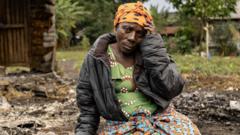**Prime Minister Keir Starmer addresses the rise of online radicalization following the tragic murder of three girls in Southport, emphasizing the urgency to adapt counter-terrorism legislation.**
**New Online Extremism Threats Highlighted by U.K. Prime Minister**

**New Online Extremism Threats Highlighted by U.K. Prime Minister**
**Keir Starmer's Warning After Southport Tragedy Sparks Calls for Change in Terrorism Laws**
In a significant address delivered on Tuesday at Downing Street, Prime Minister Keir Starmer raised alarms about an emergent and troubling form of extremism taking root in the UK. This warning closely follows the tragic case of 18-year-old Axel Rudakubana, who confessed to the shocking murders of three young girls in Southport and further attempted to harm ten others during a dance class incident last July.
Starmer articulated that the nature of this radicalization is distinct from that witnessed among organized terror groups such as Al Qaeda, asserting that it pertains instead to individuals who become enamored with violence itself, influenced by a plethora of violent content readily accessible online. He drew parallels between this occurrence and some of the more harrowing school shootings that have occurred in the United States.
The attack, which incited violent riots in several towns across England and Northern Ireland, raised critical questions about the triggers behind such unchecked aggression and how anti-terrorism measures might need revising.
Adding depth to the discussion, Serena Kennedy, chief constable of Merseyside Police, revealed that Rudakubana had accumulated an extensive collection of documents, images, and videos showcasing violence, indicating a “unhealthy obsession” without adhering to any single ideology. This lack of identifiable motive is a factor that raised complex challenges in labeling the act as terrorism.
Starmer's commentary underscores a growing concern regarding the pervasive nature of online violence and the imperative to reassess safety measures to prevent similar tragedies in the future.
Starmer articulated that the nature of this radicalization is distinct from that witnessed among organized terror groups such as Al Qaeda, asserting that it pertains instead to individuals who become enamored with violence itself, influenced by a plethora of violent content readily accessible online. He drew parallels between this occurrence and some of the more harrowing school shootings that have occurred in the United States.
The attack, which incited violent riots in several towns across England and Northern Ireland, raised critical questions about the triggers behind such unchecked aggression and how anti-terrorism measures might need revising.
Adding depth to the discussion, Serena Kennedy, chief constable of Merseyside Police, revealed that Rudakubana had accumulated an extensive collection of documents, images, and videos showcasing violence, indicating a “unhealthy obsession” without adhering to any single ideology. This lack of identifiable motive is a factor that raised complex challenges in labeling the act as terrorism.
Starmer's commentary underscores a growing concern regarding the pervasive nature of online violence and the imperative to reassess safety measures to prevent similar tragedies in the future.






















